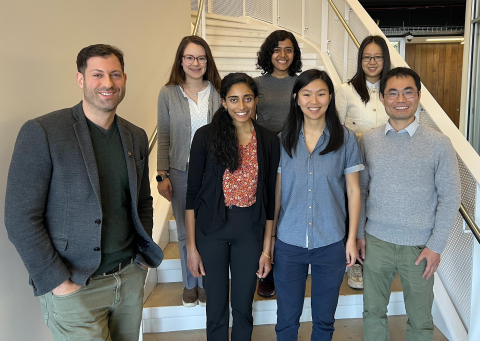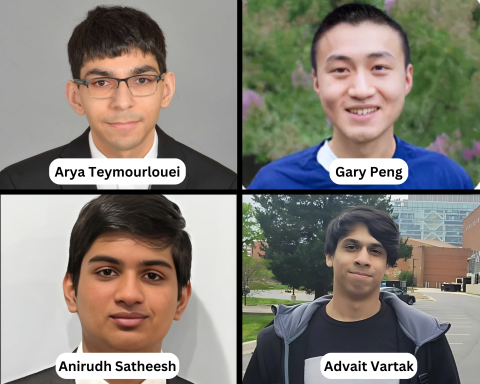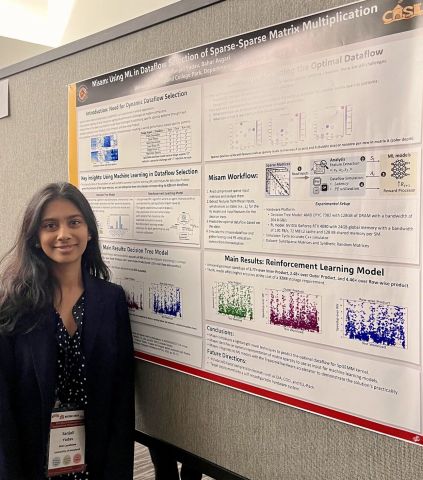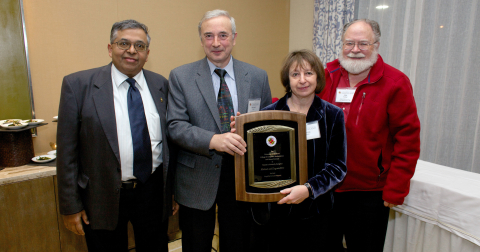Recent News & Accomplishments
2025
The prestigious award is the highest honor bestowed by the U.S. government on outstanding scientists and engineers who are early in their careers.
A University of Maryland expert in machine learning is one of 400 scientists and engineers nationwide honored today by President Biden for their exceptional potential for leadership and novel research undertaken early in their scientific careers. Soheil Feizi , an associate professor of computer science with an appointment in the University of Maryland Institute for Advanced Computer Studies (UMIACS), is the latest recipient of a Presidential Early Career Award for Scientists and Engineers (PECASE), the highest honor bestowed by the U.S. government up-and-coming researchers. Feizi is a... read more
Mathur is recognized for her dedication, outstanding service and contributions to the Department of Computer Science.
The University of Maryland recently honored Richa Mathur , assistant director of executive and faculty affairs in the Department of Computer Science, with the prestigious MVP Impact Award . This accolade recognizes her dedication to fostering a collaborative and inclusive community, her significant contributions to the department and her commitment to advancing the university's core values. “I am deeply honored to receive this award,” Mathur said. “I am grateful for the opportunities to contribute to such a vibrant and inclusive community. This recognition inspires me to continue striving for... read more
Workshop highlights efforts to promote diversity, mentorship and collaboration in machine learning research.
With a goal of advancing broader inclusion and diversity in the tech world, the University of Maryland Center for Machine Learning recently hosted an annual workshop designed to empower and engage early-stage researchers from underrepresented backgrounds in computer science and machine learning. Now in its sixth year, the Rising Stars in Machine Learning program provides a $500 honorarium and an all-expenses-paid trip to College Park, where selected scholars—a mixture of graduate students, postdocs, and early-career industry researchers—can present their research and interact with UMD’s... read more
Arya Teymourlouei, Gary Peng, Anirudh Satheesh and Advait Vartak's contributions span diverse computing research fields.
Four undergraduate students from the University of Maryland’s Department of Computer Science have received recognition from the 2024-2025 Computing Research Association’s (CRA) Outstanding Undergraduate Researcher Award . Arya Teymourlouei (B.S. ’25, computer science) was named a runner-up, while Gary Peng (B.S. ’26, computer science; B.S. ’26, mathematics), Anirudh Satheesh (B.S. ’26, computer science; B.S. ’26, mathematics) and Advait Vartak (B.S. ’26, computer science) received honorable mentions for their research contributions. This year, Sandia National Laboratories and Lawrence... read more
The award recognizes faculty excellence in teaching and research.
Christopher Metzler , an assistant professor of computer science with an appointment in the University of Maryland Institute for Advanced Computer Studies , has been honored with the 2024 Board of Visitors Junior Faculty Award from the College of Computer, Mathematical, and Natural Sciences (CMNS). The $2,500 award, presented annually in the fall, acknowledges the exceptional accomplishments of early-career faculty members in teaching and research. The award is open to assistant professors with primary appointments in CMNS who have not yet received tenure. Recipients must demonstrate... read more
UMD Ph.D. student Sanjali Yadav uses machine learning to create adaptable hardware for efficient dataflow and energy conservation.
What do personal computers (PCs), laptops, and smartphones have in common? They’re all general-purpose computing systems, meaning they can run a wide variety of tasks and offer incredible versatility. From browsing the internet to running complex statistical programs, these systems do it all. While similar in their capabilities, these diverse computing platforms also share a notable limitation—their fixed hardware design. While this allows the devices to perform a range of operations, it also prevents them from being optimized for any one specific application. Consequently, they often use... read more
2024
Eugenia Brin, a Russian immigrant and retired NASA scientist who, with her family of accomplished Terps, became an important benefactor of the University of Maryland, died on Dec. 3, 2024. She was 76 years old.
Eugenia and her husband, Professor Emeritus of Mathematics Michael Brin, supported projects that reflected their personal journeys and professional passions, donating nearly $57 million to UMD programs in mathematics, computer science, and climate science, Russian studies and the performing arts and the Campus Pantry. "The generosity of Eugenia Brin and her husband, Michael, has manifested itself in every corner of our campus, from scholarships to program funding to support for research," said UMD President Darryll J. Pines. "She was a beloved member of a storied family of Terps, and we mourn... read more
$1.3M available for interdisciplinary work focused on responsible, ethical AI development.
The University of Maryland announced on Friday a new seed award program designed to support the development of cutting-edge, interdisciplinary artificial intelligence-related research projects and courses. The $1.3 million in grants will be administered by the Artificial Intelligence Interdisciplinary Institute at Maryland (AIM), a collaborative hub launched last spring to conduct research, offer innovative and experiential learning opportunities for students and focus on responsible and ethical AI technology to advance the public good. UMD and its philanthropic and industry partners plan to... read more
Debanjan Saha ’95 discusses how nontraditional paths can lead to leadership in tech-driven industries.
There is a constant desire to find the companies of tomorrow. For the last seven years, Fortune has highlighted the companies that despite increasing competition and global volatility, are set down a path for long-term growth. The Future 50 list focuses on those likely to adapt, thrive, and grow—and serves in part as a guide for those seeking partners and role models. But for those looking to one day lead a company that may be the next big thing, the educational background of the Future 50 CEOs may surprise you. No, they did not all attend an Ivy League institution or go to business school... read more
Sreyan Ghosh received the award for his research that aims to improve audio reasoning in AI systems.
Imagine an AI system that doesn’t just transcribe speech but can truly understand, reason and respond like an expert. This vision is at the heart of University of Maryland Ph.D. student Sreyan Ghosh ’s research, which seeks to revolutionize audio processing in artificial intelligence. His work, which addresses limitations in data efficiency and representation learning, has earned him the highly competitive NVIDIA 2025-2026 Graduate Fellowship , positioning him to advance what AI systems can achieve with sound. Ghosh is among ten recipients selected from nearly 600 applications worldwide. The... read more









